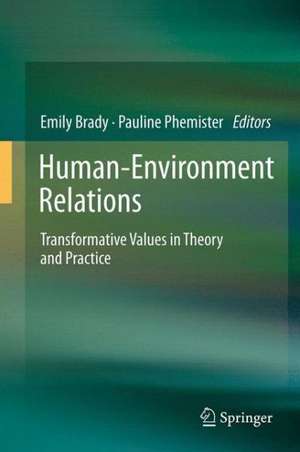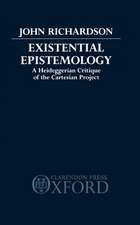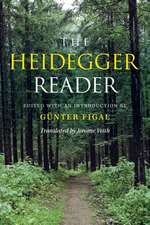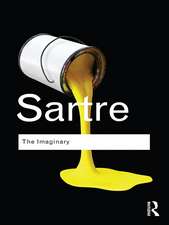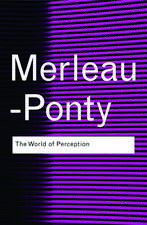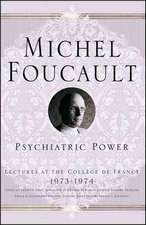Human-Environment Relations: Transformative Values in Theory and Practice
Editat de Emily Brady, Pauline Phemisteren Limba Engleză Paperback – 13 apr 2014
| Toate formatele și edițiile | Preț | Express |
|---|---|---|
| Paperback (1) | 635.15 lei 6-8 săpt. | |
| SPRINGER NETHERLANDS – 13 apr 2014 | 635.15 lei 6-8 săpt. | |
| Hardback (1) | 639.25 lei 6-8 săpt. | |
| SPRINGER NETHERLANDS – 2 feb 2012 | 639.25 lei 6-8 săpt. |
Preț: 635.15 lei
Preț vechi: 747.23 lei
-15% Nou
Puncte Express: 953
Preț estimativ în valută:
121.53€ • 126.89$ • 100.59£
121.53€ • 126.89$ • 100.59£
Carte tipărită la comandă
Livrare economică 05-19 aprilie
Preluare comenzi: 021 569.72.76
Specificații
ISBN-13: 9789401781633
ISBN-10: 940178163X
Pagini: 188
Ilustrații: XXII, 166 p.
Dimensiuni: 155 x 235 x 10 mm
Greutate: 0.27 kg
Ediția:2012
Editura: SPRINGER NETHERLANDS
Colecția Springer
Locul publicării:Dordrecht, Netherlands
ISBN-10: 940178163X
Pagini: 188
Ilustrații: XXII, 166 p.
Dimensiuni: 155 x 235 x 10 mm
Greutate: 0.27 kg
Ediția:2012
Editura: SPRINGER NETHERLANDS
Colecția Springer
Locul publicării:Dordrecht, Netherlands
Public țintă
ResearchCuprins
Introduction.- PART I: TRANSFORMATIVE VALUES IN THEORY.- 1. The Value Space of Meaningful Relations.- 2. Relational Space and Places of Value.- 3. Conserving Nature’s Meanings.- 4. Revaluing Body and Earth.- 5. Hölderlin and Human-Nature Relations.- 6. Toward History and the Creaturely: Language and the Intertextual Literary Value Space in Jonathan Safran Foer’s Eating Animals.- 7. The Intimacy of Art and Nature.- PART II: TRANSFORMATIVE VALUES IN PRACTICE.- 8. Embodying Climate Change: Renarrating Energy through the Senses and the Spirit.- 9. Make, Do, and Mend: Solving Placelessness through Embodied Environmental Engagement.- 10. Art and Living Things: The Ethical, Aesthetic Impulse.- 11. The Embodiment of Nature: Fishing, Emotion and the Politics of Environmental Values.- 12. Ethics and Aesthetics of Environmental Engagement.- Index.
Textul de pe ultima copertă
This fresh and innovative approach to human-environmental relations will revolutionise our understanding of the boundaries between ourselves and the environment we inhabit. The anthology is predicated on the notion that values shift back and forth between humans and the world around them in an ethical communicative zone called ‘value-space’. The contributors examine the transformative interplay between external environments and human values, and identify concrete ways in which these norms, residing in and derived from self and society, are projected onto the environment.
The authors represent a richly diverse range of disciplines, including philosophy, theology, human geography, literature and the arts, each addressing the interwoven nature of human-environment relations and exploring the subject through abstract theory and concrete applications alike. The work includes specific and practical contexts such as climate change and community gardening as well as less tangible aspects of our complex yet interdependent connection with the world around us. As a critical interrogation of human-nature separations, this book seeks to reintegrate the two. It will interest academics and practitioners working in philosophy, environmental studies, the environmental social sciences, and the arts.
The authors represent a richly diverse range of disciplines, including philosophy, theology, human geography, literature and the arts, each addressing the interwoven nature of human-environment relations and exploring the subject through abstract theory and concrete applications alike. The work includes specific and practical contexts such as climate change and community gardening as well as less tangible aspects of our complex yet interdependent connection with the world around us. As a critical interrogation of human-nature separations, this book seeks to reintegrate the two. It will interest academics and practitioners working in philosophy, environmental studies, the environmental social sciences, and the arts.
Caracteristici
Adopts a multidisciplinary approach to understanding human-environment relations Addresses contemporary environmental topics such as climate change, ecological art, gardens, animals Blends philosophical theory and environmental practice Critically advances knowledge of how human/environment dualisms can be both crossed and overcome Develops the concept of ‘value-space’ in relation to environments and explores its transformative significance
